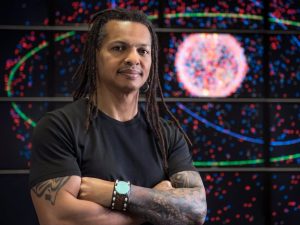 On April 5, 2021, the College of the Environment welcomed Moriba Jah, associate professor at The University of Texas at Austin, to present his lecture Near-Earth Space: The Lost Ecological Pleiad. The Earth has a number of ecosystems we can call an ecological Pleiades. To date, these ecological Pleiades have been constrained to the land, oceans, and air. However, there is an additional ecosystem, near-Earth space, which has yet to be globally acknowledged. To this end, Jah’s lecture focused on near-Earth space as a “lost” ecological Pleiad, comprised of “some abiotic objects such as micrometeoroids, a few humans in the Space Station, and a large number of anthropogenic space objects as a consequence of our technological developments.” In his lecture, Jah explored the known evolution of this Lost Pleiad, and underscored the need for its environmental protection.
On April 5, 2021, the College of the Environment welcomed Moriba Jah, associate professor at The University of Texas at Austin, to present his lecture Near-Earth Space: The Lost Ecological Pleiad. The Earth has a number of ecosystems we can call an ecological Pleiades. To date, these ecological Pleiades have been constrained to the land, oceans, and air. However, there is an additional ecosystem, near-Earth space, which has yet to be globally acknowledged. To this end, Jah’s lecture focused on near-Earth space as a “lost” ecological Pleiad, comprised of “some abiotic objects such as micrometeoroids, a few humans in the Space Station, and a large number of anthropogenic space objects as a consequence of our technological developments.” In his lecture, Jah explored the known evolution of this Lost Pleiad, and underscored the need for its environmental protection.
Jah opened the lecture by giving context to the sheer number of human-made objects in Earth’s orbit. The assumed population of space objects is roughly half a million, ranging in size from a speck of paint to the International Space Station. Jah stressed that of that assumed half million, we can only measure about 30,000, and the total space population is unmeasurable with the precision of current instruments. He also noted that out of those potential 500,000 objects, only 3,500 are functioning, saying, “Much less than 1 percent of everything up there that we’re responsible for actually serves a purpose.”
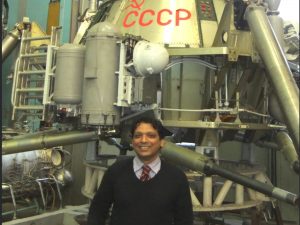 Wesleyan’s College of the Environment and History Department invited Dr. Asif Siddiqi, Professor of History at Fordham University in New York, to host his talk,
Wesleyan’s College of the Environment and History Department invited Dr. Asif Siddiqi, Professor of History at Fordham University in New York, to host his talk, 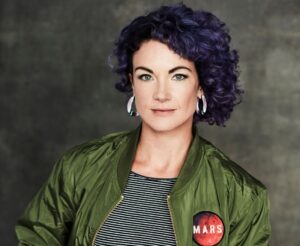 On December 8, 2020, the College of the Environment welcomed Lucianne Walkowicz, an astronomer at the Adler Planetarium in Chicago and co-founder of the JustSpace Alliance, to host their lecture,
On December 8, 2020, the College of the Environment welcomed Lucianne Walkowicz, an astronomer at the Adler Planetarium in Chicago and co-founder of the JustSpace Alliance, to host their lecture, 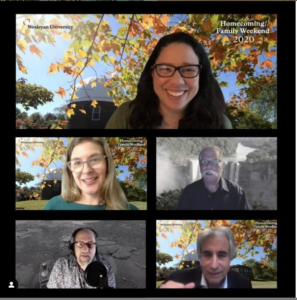 As part of the 18th annual Where On Earth Are We Going? Robert F. Schumann Environmental Studies Symposium, David Grinspoon and Martha Gilmore presented their talk, “Habitability and Life on Venus,” on October 17, 2020.
As part of the 18th annual Where On Earth Are We Going? Robert F. Schumann Environmental Studies Symposium, David Grinspoon and Martha Gilmore presented their talk, “Habitability and Life on Venus,” on October 17, 2020.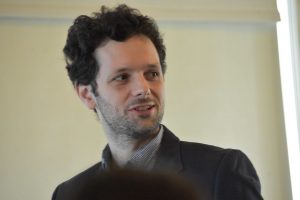 Alexander Wragge-Morley, Clinical Assistant Professor of Liberal Studies and History at New York University, visited campus on February 12, 2020, to share his lecture, “Words, Experience & Non-Resemblance: Representing Nature in 17th-Century England.” He discussed the way English naturalists, particularly botanist John Ray (1627-1705), represented their findings about concrete research in the natural world through figures meant to evoke emotional responses from their viewers.
Alexander Wragge-Morley, Clinical Assistant Professor of Liberal Studies and History at New York University, visited campus on February 12, 2020, to share his lecture, “Words, Experience & Non-Resemblance: Representing Nature in 17th-Century England.” He discussed the way English naturalists, particularly botanist John Ray (1627-1705), represented their findings about concrete research in the natural world through figures meant to evoke emotional responses from their viewers. Meaning and language are commonly thought to be the exclusive province of humans. But is this thinking simply our own anthropocentric conceit? On November 2, 2019, Menakka and Essel Bailey ‘66 Distinguished Visiting Scholar in the College of the Environment Charles Siebert led a discussion about the nature of meaning in the world, the myriad of forms in which it manifests, and the many ways in which they inform our place in the world. The discussion, What on Earth Are They Saying: Listening and Learning Beyond the Human, was the 17th Annual Where on Earth Are We Going? seminar sponsored by the Robert F. Schumann Institute of the College of the Environment.
Meaning and language are commonly thought to be the exclusive province of humans. But is this thinking simply our own anthropocentric conceit? On November 2, 2019, Menakka and Essel Bailey ‘66 Distinguished Visiting Scholar in the College of the Environment Charles Siebert led a discussion about the nature of meaning in the world, the myriad of forms in which it manifests, and the many ways in which they inform our place in the world. The discussion, What on Earth Are They Saying: Listening and Learning Beyond the Human, was the 17th Annual Where on Earth Are We Going? seminar sponsored by the Robert F. Schumann Institute of the College of the Environment.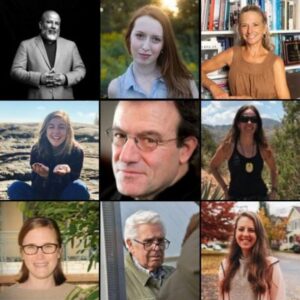
 Last weekend various Wesleyan sustainability groups joined local community gardeners, farmers, and activists for a conference on all things urban farming and food justice. The event was cosponsored by the Green Fund, the Middletown Economic Development Commission, the College of the Environment, the Wesleyan Resource Center, the Science in Society Program, and the African American Studies Department. With this wide array of support, student coordinators were able to collaborate with local stakeholders to put together a conference that was able to bridge the gap between Wesleyan and the surrounding community, as well as to provide the space for connections between Wes sustainability groups.
Last weekend various Wesleyan sustainability groups joined local community gardeners, farmers, and activists for a conference on all things urban farming and food justice. The event was cosponsored by the Green Fund, the Middletown Economic Development Commission, the College of the Environment, the Wesleyan Resource Center, the Science in Society Program, and the African American Studies Department. With this wide array of support, student coordinators were able to collaborate with local stakeholders to put together a conference that was able to bridge the gap between Wesleyan and the surrounding community, as well as to provide the space for connections between Wes sustainability groups.